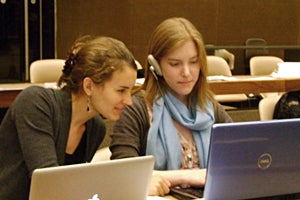It was a short, simple statement, and the chair of the Fourth Review Conference of the Convention on Conventional Weapons made it without fanfare: he could find no consensus on the proposed treaty language. The matter would be dropped.
And with that, at precisely 7:05 p.m. on November 25, a decade’s worth of discussion and advocacy came to a close. It was a major milestone for supporters of the 2008 Convention on Cluster Munitions, including the International Human Rights Clinic, which has been pushing for the convention’s absolute ban on the weapons for several years.
“This was a dramatic victory for us—almost as inspiring as the adoption of the Convention on Cluster Munitions,” said Senior Clinical Instructor Bonnie Docherty ’01, who is also a senior researcher in the Arms Division of Human Rights Watch. “In a sense, we’ve banned cluster munitions for a second time.”
More than 100 states have already signed on to the Convention on Cluster Munitions, an international treaty that took legal effect last year and which prohibits the use, production, stockpiling and transfer of the weapons. Still, some states—including the U.S., Russia, and China—have been reluctant to sign the ban. They have focused instead on developing weaker language under a different treaty framework—the 1980 Convention on Conventional Weapons.
Negotiations over that language, which would have allowed some use of cluster munitions, dominated the Fourth Review Conference. In a joint paper, released there with Human Rights Watch, the clinic detailed how, if it had been adopted, the protocol would have been the first international humanitarian law treaty to contain weaker protections for civilians than those in an existing treaty on the same subject. It would have also directly threatened the Convention on Cluster Munitions, legitimizing weapons that many states have already recognized as causing unacceptable and indiscriminate harm.
“This dangerous language has been passing hands for over a decade,” said Robert Yoskowitz ’13, who traveled to Geneva with Docherty and two other students. “It was alarming to see it actually reach the point of possible approval, especially at a time when so many nations have already recognized that cluster munitions cause unacceptable and indiscriminate harm.”
Because they are often dropped in populated areas, and because they release dozens of submunitions, cluster munitions are virtually guaranteed to cause civilian casualties during strikes. In addition, many submunitions fail to explode on impact and become de facto landmines, detonated by civilians years later.
Over the years, at least 20 students have participated in the clinic’s cluster munitions effort, conducting research, writing reports, and lobbying at diplomatic conferences from Lebanon to Laos. In Geneva, Yoskowitz, Anna Crowe, LL.M. ’12, and Nicolette Boehland, ’13, worked 18-hour days as members of the Human Rights Watch delegation, providing real-time legal analysis for representatives at the conference.
“For three students used to long, quiet hours studying theory, this was a rare chance to participate in the making and defending of international law,” they wrote in a piece for the clinic’s blog.

As the students relate, there was no shortage of suspense at the November conference. The U.S. made a formal proposal for new treaty language an hour and a half before the conference was scheduled to end, arguing that its amendment was a concession that should be accepted as a matter of compromise.
In the end, a group of 50 states, represented by a delegate from Costa Rica, made their opposition known. For Crowe, it was an inspiring moment.
“We were all sitting there, with our hearts beating fast, thinking: what’s going to happen?” she said. “Seeing all that hard work pay off, and being with the people who had made it happen, it was a moment that will stay with me forever.”
Under Docherty’s leadership, the clinic will now shift its focus to promoting the Convention on Cluster Munitions and helping states to implement that treaty. Beyond banning cluster munitions themselves, the law requires states to destroy stockpiles, clear unexploded submunitions, and provide critical help to civilians affected by the weapons.
For more on the clinic’s cluster munitions work, and the reports it has released with Human Rights Watch, click here.